综合英语教程5 Unit 6 课文翻译
研究生英语综合教程UNIT6课文及翻译(含汉译英英译汉)
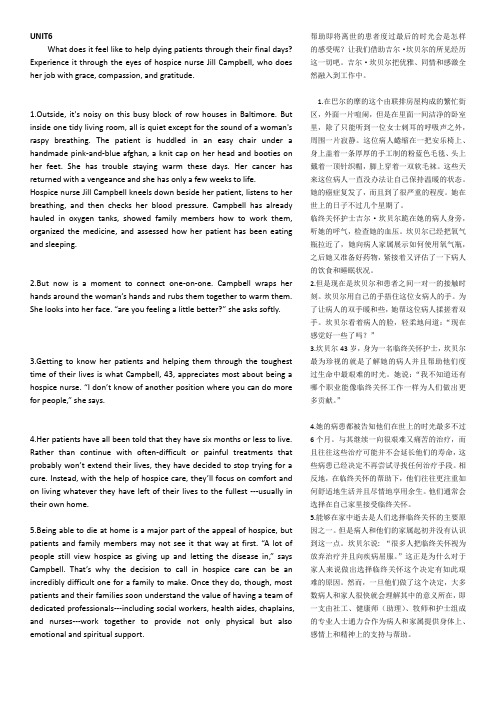
UNIT6What does it feel like to help dying patients through their final days? Experience it through the eyes of hospice nurse Jill Campbell, who does her job with grace, compassion, and gratitude.1.Outside, it's noisy on this busy block of row houses in Baltimore. But inside one tidy living room, all is quiet except for the sound of a woman's raspy breathing. The patient is huddled in an easy chair under a handmade pink-and-blue afghan, a knit cap on her head and booties on her feet. She has trouble staying warm these days. Her cancer has returned with a vengeance and she has only a few weeks to life. Hospice nurse Jill Campbell kneels down beside her patient, listens to her breathing, and then checks her blood pressure. Campbell has already hauled in oxygen tanks, showed family members how to work them, organized the medicine, and assessed how her patient has been eating and sleeping.2.But now is a moment to connect one-on-one. Campbell wraps her hands aro und the woman’s hands and rubs them together to warm them. She looks into her face. “are you feeling a little better?” she asks softly.3.Getting to know her patients and helping them through the toughest time of their lives is what Campbell, 43, appreciates most about being a hospice nurse. “I don’t know of another position where you can do more for people,” she says.4.Her patients have all been told that they have six months or less to live. Rather than continue with often-difficult or painful treatments that probably won’t extend their lives, they have decided to stop trying for a cure. Instead, with the help of hospice care, they’ll focus on comfort and on living whatever they have left of their lives to the fullest ---usually in their own home.5.Being able to die at home is a major part of the appeal of hospice, but patients and family members may not see it that way at first. “A lot of people still view hospice as giving up and letting the disease in,” says Campbell. That’s why the decision to c all in hospice care can be an incredibly difficult one for a family to make. Once they do, though, most patients and their families soon understand the value of having a team of dedicated professionals---including social workers, health aides, chaplains, and nurses---work together to provide not only physical but also emotional and spiritual support. 帮助即将离世的患者度过最后的时光会是怎样的感受呢?让我们借助吉尔·坎贝尔的所见经历这一切吧。
全新版大学英语(第二版)综合教程5-Unit 5课后答案及课文翻译
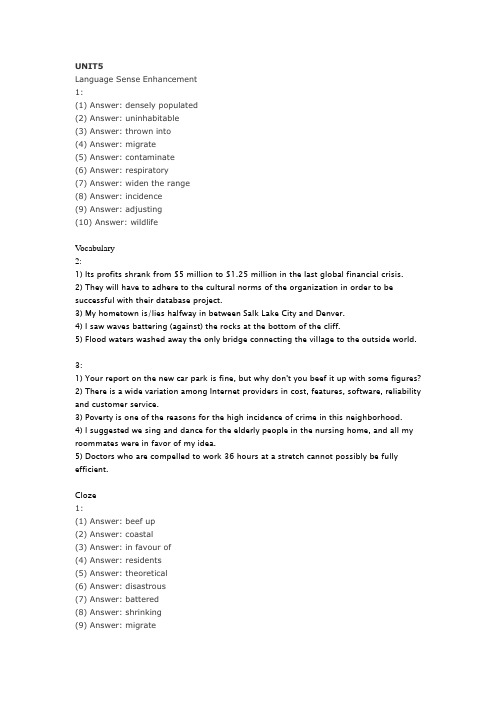
UNIT5Language Sense Enhancement1:(1) Answer: densely populated(2) Answer: uninhabitable(3) Answer: thrown into(4) Answer: migrate(5) Answer: contaminate(6) Answer: respiratory(7) Answer: widen the range(8) Answer: incidence(9) Answer: adjusting(10) Answer: wildlifeV ocabulary2:1) Its profits shrank from $5 million to $1.25 million in the last global financial crisis.2) They will have to adhere to the cultural norms of the organization in order to be successful with their database project.3) My hometown is/lies halfway in between Salk Lake City and Denver.4) I saw waves battering (against) the rocks at the bottom of the cliff.5) Flood waters washed away the only bridge connecting the village to the outside world.3:1) Your report on the new car park is fine, but why don't you beef it up with some figures?2) There is a wide variation among Internet providers in cost, features, software, reliability and customer service.3) Poverty is one of the reasons for the high incidence of crime in this neighborhood.4) I suggested we sing and dance for the elderly people in the nursing home, and all my roommates were in favor of my idea.5) Doctors who are compelled to work 36 hours at a stretch cannot possibly be fully efficient.Cloze1:(1) Answer: beef up(2) Answer: coastal(3) Answer: in favour of(4) Answer: residents(5) Answer: theoretical(6) Answer: disastrous(7) Answer: battered(8) Answer: shrinking(9) Answer: migrate(10) Answer: washed away(11) Answer: Scary(12) Answer: humanity2:(1) Answer: predicting(2) Answer: accuracy(3) Answer: basis(4) Answer: collide(5) Answer: atmosphere(6) Answer: melts(7) Answer: affected(8) Answer: actions(9) Answer: striving(10) Answer: technologiesTranslationMost scientists no longer doubt that the world is warming up and that humanity has altered climate. They agree that the long-term effects of global warming will be disastrous for the planet and its inhabitants. What is more, climate change won't be a smooth transition to a warmer world. Some regions will be greatly affected by abrupt climate changes. Enormous areas of densely populated land like coastal Florida would become uninhabitable. Hundreds of millions of residents would have to migrate to safer regions. Therefore, it is no surprise that global warming has made its way onto the agenda of world leaders.译文:我们献上一篇《时代》杂志编辑们撰写的文章,以此开始审视全球气候变暖问题。
全新版大学英语综合教程4课后翻译(完整版)
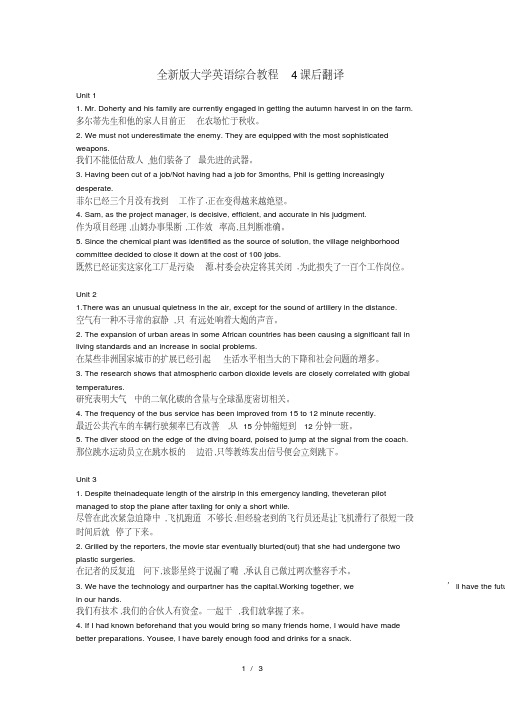
全新版大学英语综合教程4课后翻译Unit 11. Mr. Doherty and his family are currently engaged in getting the autumn harvest in on the farm.多尔蒂先生和他的家人目前正在农场忙于秋收。
2. We must not underestimate the enemy. They are equipped with the most sophisticatedweapons.我们不能低估敌人,他们装备了最先进的武器。
3. Having been cut of a job/Not having had a job for 3months, Phil is getting increasinglydesperate.菲尔已经三个月没有找到工作了,正在变得越来越绝望。
4. Sam, as the project manager, is decisive, efficient, and accurate in his judgment.作为项目经理,山姆办事果断,工作效率高,且判断准确。
5. Since the chemical plant was identified as the source of solution, the village neighborhoodcommittee decided to close it down at the cost of 100 jobs.既然已经证实这家化工厂是污染源,村委会决定将其关闭,为此损失了一百个工作岗位。
Unit 21.There was an unusual quietness in the air, except for the sound of artillery in the distance.空气有一种不寻常的寂静,只有远处响着大炮的声音。
2. The expansion of urban areas in some African countries has been causing a significant fall inliving standards and an increase in social problems.在某些非洲国家城市的扩展已经引起生活水平相当大的下降和社会问题的增多。
综合英语教程5(第三版邹为诚)-unit6 Omnigamy---haidee

综合英语教程5(第三版邹为诚)-unit6 Omnigamy---haidee综合英语教程5(第三版邹为诚)大三上Unit SixOmnigamy综合英语教程5(第三版邹为诚)大三上Objectives Understanding the influence of omnigamy upon family and society Searching for “good family” in different culture Understanding family issues, including family structures, values relationships Exploring family relationships in American culture Exploring cultural differences in the concept of a happy family综合英语教程5(第三版邹为诚)大三上Pre-reading questions: 1. What is omnigamy? 2. Is it common in China? 3. Is it good or bad for children? Main Idea: Omnigamy is a new phenomenon in our society, however, it has some negative effects upon our children as well as adults though it may bring some personal freedom.综合英语教程5(第三版邹为诚)大三上Para 1 Introduction:our society has moved toward a pattern of serial polygamy, people are experiencing more than one spouse---omnigamy. (Introducing the topic by an example.) Para 2 Marriage is still under the protection of law in spite of the high divorce rate.综合英语教程5(第三版邹为诚)大三上Para 3-6 The consequence of omnigamy may have serious effects on both children and adults, sometimes for life time. a. confusion in family relationship b. a sense of unsafety or unstablity/personal plight c. bad examples for the young d. broken ties between grandparents and their grandchildren综合英语教程5(第三版邹为诚)大三上Para 7 Although people may enjoy the right of free choice in omnigamy, yet they could suffer a lot from this practice which has not yet made a clear mark on the society now. -confusion and pain 综合英语教程5(第三版邹为诚)大三上Difficult Sentences: 1. The not-so-stately pageant of marriage goes on, heedless of the cautionary cries of pain and the clenched question: Why? The public practice/performance of getting married which is not so impressive and beneficial still keeps ondoing, regardless of the warning fact that people often feel painful and ask “why” angrily in the sate of marriage.综合英语教程5(第三版邹为诚)大三上2. When parents divorce and remarry, the new family connections extend the reach of family to overwhelming dimensions.When parents get separated and married again, the new family relations may become very complicated as they involve many formal family members of the newly married couple.综合英语教程5(第三版邹为诚)大三上3. The generation of children spawned by the Age of Omnigamy has not yet made its mark on the social system in any way.The effect of children born in the Age of Omnigamy is still not clearly seen in society.综合英语教程5(第三版邹为诚)大三上4. We cannot know whether they are immune, immunized, or carries of the bug across generational lines.We do not know whether they will be affected by omnigamy or this effect may appear many years later after several generations.综合英语教程5(第三版邹为诚)大三上Question 1Harmful effects: Creating confusion in relationship It is a personal plight Children face overwhelmingly extensive attentiveness in all relationships, who may find it easy to accept when young but hard to avoid when they become adults, they may lose role models in life Bad examples for the young Grandparents suffer too, their ties to the young children are broken, or have to be mediated by strangers The only benefit: personal freedom in picking a spouse综合英语教程5(第三版邹为诚)大三上Question 2 helps to create a linguistic imagery that the newly emerging marriage practice is too fast, too confusing, too complicated and too unreasonable综合英语教程5(第三版邹为诚)大三上Question 3 Yes: the conventional marriage pattern is changed as dictated by changes in society. The change is necessary as human civilization progresses No: change does more harm than good to human society综合英语教程5(第三版邹为诚)大三上Question 4 New century would not tolerate families with more than two children because of the changing patterns of marriage.a. Frequent cycles of marriage and remarriage makes it hard to bring many children aroundb. Remarried parents get lost with thechildren if each family has 4 or 5. c. The rapid cycles of marriagechildren. and remarriage makes it impossible for a couple to have many。
新编大学英语综合教程Unit 5-课文翻译
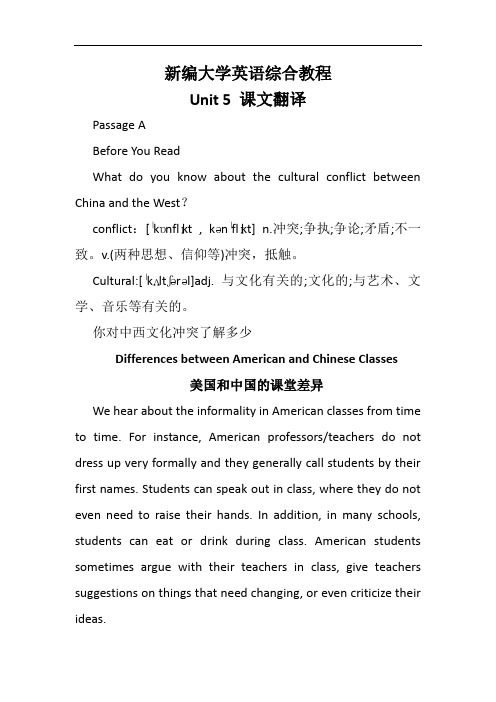
新编大学英语综合教程Unit 5 课文翻译Passage ABefore You ReadWhat do you know about the cultural conflict between China and the West?conflict:[ˈkɒnflɪkt , kənˈflɪkt] n.冲突;争执;争论;矛盾;不一致。
v.(两种思想、信仰等)冲突,抵触。
Cultural:[ˈkʌltʃərəl]adj. 与文化有关的;文化的;与艺术、文学、音乐等有关的。
你对中西文化冲突了解多少Differences between American and Chinese Classes美国和中国的课堂差异We hear about the informality in American classes from time to time. For instance, American professors/teachers do not dress up very formally and they generally call students by their first names. Students can speak out in class, where they do not even need to raise their hands. In addition, in many schools, students can eat or drink during class. American students sometimes argue with their teachers in class, give teachers suggestions on things that need changing, or even criticize their ideas.hear about 得知; 听到关于from time to time 不时地;间或;偶尔For instance 例如;譬如。
全新版大学英语(第二版)综合教程5-Unit-6课后答案及课文翻译
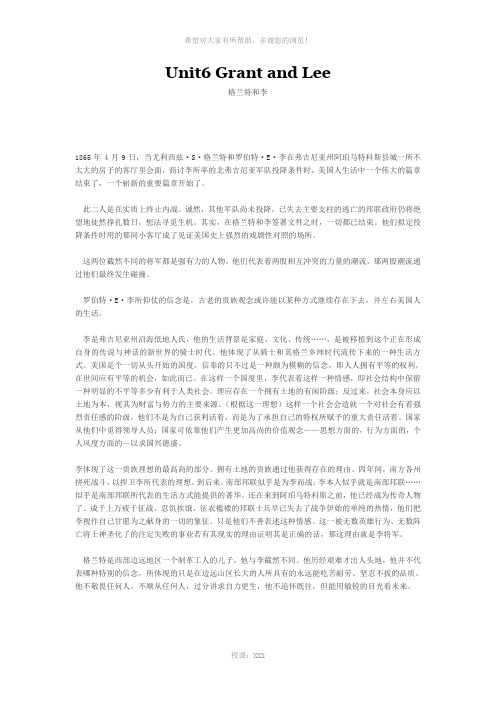
Unit6 Grant and Lee格兰特和李1865年4月9日,当尤利西兹·S·格兰特和罗伯特·E·李在弗吉尼亚州阿珀马特科斯县城一所不太大的房子的客厅里会面,商讨李所率的北弗吉尼亚军队投降条件时,美国人生活中一个伟大的篇章结束了,一个崭新的重要篇章开始了。
此二人是在实质上终止内战。
诚然,其他军队尚未投降,已失去主要支柱的逃亡的邦联政府仍将绝望地徒然挣扎数日,想法寻觅生机。
其实,在格兰特和李签署文件之时,一切都已结束。
他们拟定投降条件时用的那间小客厅成了见证美国史上强烈的戏剧性对照的场所。
这两位截然不同的将军都是强有力的人物,他们代表着两股相互冲突的力量的潮流,那两股潮流通过他们最终发生碰撞。
罗伯特·E·李所仰仗的信念是,古老的贵族观念或许能以某种方式继续存在下去,并左右美国人的生活。
李是弗吉尼亚州沿海低地人氏,他的生活背景是家庭、文化、传统……,是被移植到这个正在形成自身的传说与神话的新世界的骑士时代。
他体现了从骑士和英格兰乡绅时代流传下来的一种生活方式。
美国是个一切从头开始的国度,信奉的只不过是一种颇为模糊的信念,即人人拥有平等的权利,在世间应有平等的机会,如此而已。
在这样一个国度里,李代表着这样一种情感,即社会结构中保留一种明显的不平等多少有利于人类社会。
理应存在一个拥有土地的有闲阶级;反过来,社会本身应以土地为本,视其为财富与势力的主要来源。
(根据这一理想)这样一个社会会造就一个对社会有着强烈责任感的阶级,他们不是为自己获利活着,而是为了承担自己的特权所赋予的重大责任活着。
国家从他们中觅得领导人员;国家可依靠他们产生更加高尚的价值观念——思想方面的,行为方面的,个人风度方面的—以求国兴德盛。
李体现了这一贵族理想的最高尚的部分。
拥有土地的贵族通过他获得存在的理由。
四年间,南方各州拼死战斗,以捍卫李所代表的理想。
到后来,南部邦联似乎是为李而战;李本人似乎就是南部邦联……似乎是南部邦联所代表的生活方式能提供的菁华。
新编大学英语综合教程Unit6-A-课文翻译

新编大学英语综合教程Unit 6课文翻译Passage ABefore You ReadWhat do you think of the importance of making friends in daily life?你认为在日常生活中交朋友的重要性是什么?Friends and Friendship朋友和友情There is a famous line- No man is an island from John Donne's Devotion, written more than three hundred years ago. Even now almost everyone doesn't agree him more. No one could lead an ordinary life without friends. Otherwise, our life would be“boring”“dead", and even“out”. Especially in trouble, just like an old saying goes: a friend in need is a friend indeed. We need friends to pour out, communicate, help, support, and encourage. On the contrary, we also need friends to share our joys. But for some of us, it is not easy to make friend.有一句名言——没有人可以成为一座孤岛,这是约翰·唐恩写于三百多年前的关照。
即使现在,几乎每个人都不同意他。
没有朋友,没有人能过上平凡的生活。
否则,我们的生活会“无聊”“死亡”,甚至“出局”。
Unit4UnforgettableTeachers全新版大学英语综合教程五课文翻译(最新整理)

Unit 4 Unforgettable TeachersText A Take This Fish and Look at It1 It was more than fifteen years ago that I entered the laboratory of Professor Agassiz, and told him I had enrolled my name in the Scientific School as a student of natural history . He asked me a few questions about my object in coming, my antecedents generally, the mode in which I afterwards proposed to use the knowledge I might acquire, and, finally, whether I wished to study any special branch. To the latter I replied that while I wished to be well grounded in all departments of zoology, I purposed to devote myself especially to insects.2 "When do you wish to begin?" he asked.3 "Now," I replied.4 This seemed to please him, and with an energetic "Very well!" he reached from a shelfa huge jar of specimens in yellow alcohol. "Take this fish," he said, "and look at it; we call it a haemulon; by and by I will ask what you have seen."5 With that he left me, but in a moment returned with explicit instructions as to the care of the object entrusted to me.6 "No man is fit to be a naturalist," said he, "who does not know how to take care of specimens."7 I was to keep the fish before me in a tin tray, and occasionally moisten the surface with alcohol from the jar, always taking care to replace the stopper tightly. Those were not the days of ground-glass stoppers and elegantly shaped exhibition jars; all the old students will recall the huge neckless glass bottles with their leaky, wax-besmeared corks, half eaten by insects, and begrimed with cellar dust. Entomology was a cleaner science than ichthyology, but the example of the Professor, who had unhesitatingly plunged to the bottom of the jar to produce the fish, was infectious; and though this alcohol had a "very ancient and fishlike smell," I really dared not show any aversion within these sacred precincts, and treated the alcohol as though it were pure water. Still I was conscious of a passing feeling of disappointment, for gazing at a fish did not commend itself to an ardent entomologist. My friends at home, too, were annoyed when they discovered that no amount of eau-de-Cologne would drown the perfume which haunted me like a shadow.8 In ten minutes I had seen all that could be seen in that fish, and started in search of the Professor — who had, however, left the Museum; and when I returned, after lingering over some of the odd animals stored in the upper apartment, my specimen was dry all over. I dashed the fluid over the fish as if to resuscitate the beast from a fainting fit, and looked with anxiety for a return of the normal sloppy appearance. This little excitementover, nothing was to be done but to return to a steadfast gaze at my mute companion. Half an hour passed — an hour — another hour; the fish began to look loathsome. I turned it over and around; looked it in the face — ghastly; from behind, beneath, above, sideways, at three-quarters' view — just as ghastly. I was in despair; at an early hour I concluded that lunch was necessary; so, with infinite relief, the fish was carefully replaced in the jar, and for an hour I was free.9 On my return, I learned that Professor Agassiz had been at the Museum, but had gone, and would not return for several hours. My fellow-students were too busy to be disturbed by continued conversation. Slowly I drew forth that hideous fish, and with a feeling of desperation again looked at it. I might not use a magnifying-glass; instruments of all kinds were interdicted. My two hands, my two eyes, and the fish: it seemed a most limited field. I pushed my finger down its throat to feel how sharp the teeth were. I began to count the scales in the different rows, until I was convinced that was nonsense. At last a happy thought struck me — I would draw the fish; and with surprise I began to discover new features in the creature. Just then the Professor returned.10 "That is right," said he; "a pencil is one of the best of eyes. I am glad to notice, too, that you keep your specimen wet, and your bottle corked."11 With these encouraging words, he added: "Well, what is it like?"12 He listened attentively to my brief rehearsal of the structure of parts whose names were still unknown to me: the fringed gill-arches and movable operculum; the pores of the head, fleshy lips and lidless eyes; the lateral line, the spinous fins and forked tail; the compressed and arched body. When I finished, he waited as if expecting more, and then, with an air of disappointment:13 "You have not looked very carefully; why," he continued more earnestly, "you haven't even seen one of the most conspicuous features of the animal, which is plainly before your eyes as the fish itself; look again, look again!" and he left me to my misery.14 I was piqued; I was mortified. Still more of that wretched fish! But now I set myself to my task with a will, and discovered one new thing after another, until I saw how just the Professor's criticism had been. The afternoon passed quickly; and when, towards its close, the Professor inquired:15 "Do you see it yet?"16 "No," I replied, "I am certain I do not, but I see how little I saw before."17 "That is next best," said he, earnestly, "but I won't hear you now; put away your fish and go home; perhaps you will be ready with a better answer in the morning. I will examine you before you look at the fish."18 This was disconcerting. Not only must I think of my fish all night, studying, without the object before me, what this unknown but most visible feature might be; but also, without reviewing my discoveries, I must give an exact account of them the next day. I had a bad memory; so I walked home by Charles River in a distracted state, with my two perplexities.19 The cordial greeting from the Professor the next morning was reassuring; here was a man who seemed to be quite as anxious as I that I should see for myself what he saw.20 "Do you perhaps mean," I asked, "that the fish has symmetrical sides with paired organs?"21 His thoroughly pleased "Of course! Of course!" repaid the wakeful hours of the previous night. After he had discoursed most happily and enthusiastically — as he always did — upon the importance of this point, I ventured to ask what I should do next.22 "Oh, look at your fish!" he said, and left me again to my own devices. In a little more than an hour he returned, and heard my new catalogue.23 "That is good, that is good!" he repeated; "but that is not all; go on"; and so for three long days he placed that fish before my eyes, forbidding me to look at anything else, or to use any artificial aid. "Look, look, look," was his repeated injunction.24 This was the best entomological lesson I ever had — a lesson whose influence has extended to the details of every subsequent study; a legacy the Professor had left to me, as he has left it to so many others, of inestimable value which we could not buy, with which we cannot part.25 The fourth day, a second fish of the same group was placed beside the first, and I was bidden to point out the resemblances and differences between the two; another and another followed, until the entire family lay before me, and a whole legion of jars covered the table and surrounding shelves; the odor had become a pleasant perfume; and even now, the sight of an old, six-inch worm-eaten cork brings fragrant memories.26 The whole group of haemulons was thus brought in review; and, whether engaged upon the dissection of the internal organs, the preparation and examination of the bony framework, or the description of the various parts, Agassiz's training in the method of observing facts and their orderly arrangement was ever accompanied by the urgent exhortation not to be content with them.27 "Facts are stupid things," he would say, "until brought into connection with some general law."28 At the end of eight months, it was almost with reluctance that I left these friends and turned to insects; but what I had gained by this outside experience has been ofgreater value than years of later investigation in my favorite groups.把这条鱼拿去好好看看塞缪尔·斯卡德我是在15余年前进入阿加西兹教授的实验室的,告诉他我已在科学学院注册读博物学。
综英5 Unit-06 How America Lives

综合教程5(第2版)电子教案
Text Introduction | Culture Notes | Author | Structure Puritanism (Paragraph 3) the practices and doctrines of the Puritans who were members of a group of Protestants in 16th- and 17thcentury England and 17th-century America who believed in strict religious discipline and called for the simplification of acts of worship. The movement was an attempt to remove Roman Catholic influences from the Church of England.
新世纪高等院校英语专业本科系列教材(修订版) 综合教程第五册(第2版) 电子教案
Unit 6
How America Lives
上海外语教育出版社 南京信息工程大学 刘杰海
Picture Activation | Pre-questions
Can you specify typical Americans?
综合教程5(第2版)电子教案
Picture Activation | Pre-questions
1. With the ever-increasing contact between the Chinese and American peoples, we are getting to know each other better. Based on your communication with some Americans or your reading about that nation, what opinions do you hold about the American people?
综合英语教程第五册 课后答案 课件Unit-06 How America Lives
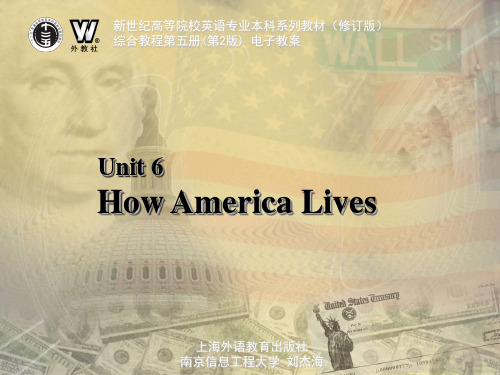
综合教程5(第2版)电子教案
Text Introduction | Culture Notes | Author | Structure Puritanism (Paragraph 3) the practices and doctrines of the Puritans who were members of a group of Protestants in 16th- and 17thcentury England and 17th-century America who believed in strict religious discipline and called for the simplification of acts of worship. The movement was an attempt to remove Roman Catholic influences from the Church of England.
综合教程5(第2版)电子教案
Text Introduction | Culture Notes | Author | Structure His other works include Sayonara (1954); Hawaii (1959); Chesapeake (1978); The Covenant (1980); Poland (1982); Texas (1985); and Alaska (1988); The Novel (1991); Recessional (1994); A Miracle in Seville (1995); The Bridge at Andau (1957); Iberia: Spanish Travels and Reflections (1968); A Michener Miscellany: 1950-1970 (1973); Michener's memoir, The World Is My Home (1992).
21世纪工程硕士研究生英语-综合教程(下册)Unit6课文翻译
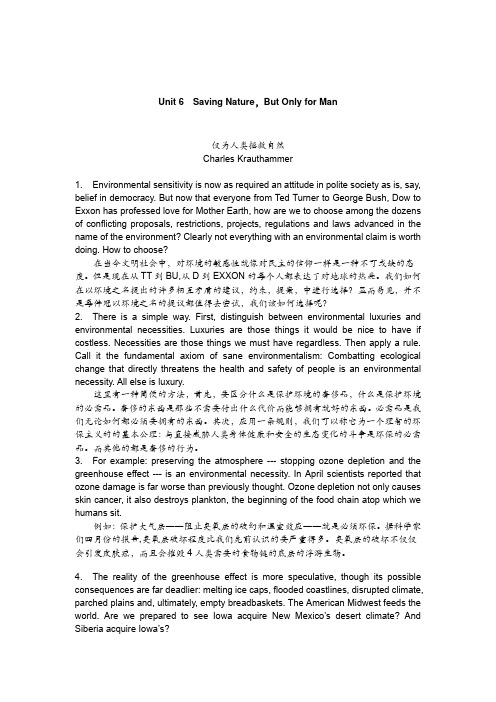
Unit 6 Saving Nature,But Only for Man仅为人类拯救自然Charles Krauthammer1. Environmental sensitivity is now as required an attitude in polite society as is, say, belief in democracy. But now that everyone from Ted Turner to George Bush, Dow to Exxon has professed love for Mother Earth, how are we to choose among the dozens of conflicting proposals, restrictions, projects, regulations and laws advanced in the name of the environment? Clearly not everything with an environmental claim is worth doing. How to choose?在当今文明社会中,对环境的敏感性就像对民主的信仰一样是一种不可或缺的态度。
但是现在从TT到BU,从D到EXXON的每个人都表达了对地球的热爱。
我们如何在以环境之名提出的许多相互矛盾的建议,约束,提案,中进行选择?显而易见,并不是每件冠以环境之名的提议都值得去尝试,我们该如何选择呢?2. There is a simple way. First, distinguish between environmental luxuries and environmental necessities. Luxuries are those things it would be nice to have if costless. Necessities are those things we must have regardless. Then apply a rule. Call it the fundamental axiom of sane environmentalism: Combatting ecological change that directly threatens the health and safety of people is an environmental necessity. All else is luxury.这里有一种简便的方法,首先,要区分什么是保护环境的奢侈品,什么是保护环境的必需品。
综合英语教程第五册 课后答案 课件Unit-04-Force of Nature
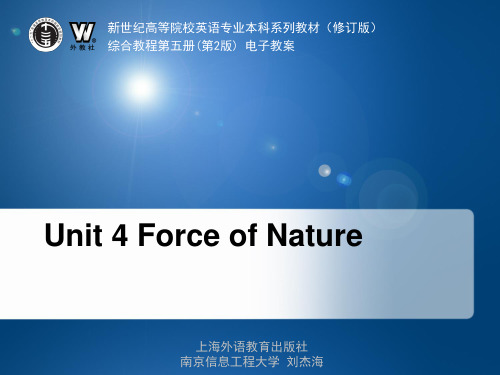
Text Introduction | Culture Notes | Author | Structure
She is the author of the acclaimed bestsellers Little Gloria…Happy At Last (1980) and Johnson v. Johnson (1987). A trustee of the New York Public Library, Goldቤተ መጻሕፍቲ ባይዱmith also serves on the President's Commission on the Celebration of Women in American History.
综合教程5(第2版)电子教案
Text Introduction | Culture Notes | Author | Structure
Marie Curie (Paragraph 1) (1867-1934), Polish-born French chemist who, with her husband Pierre Curie, was an early investigator of radioactivity. The Curies shared the 1903 Nobel Prize in physics with French physicist Antoine Henri Becquerel for fundamental research on radioactivity. Marie Curie went on to study the chemistry and medical applications of radium. She was awarded the 1911 Nobel Prize in chemistry in recognition of her work in discovering radium and polonium and in isolating radium.
综合英语教程5.Unit6
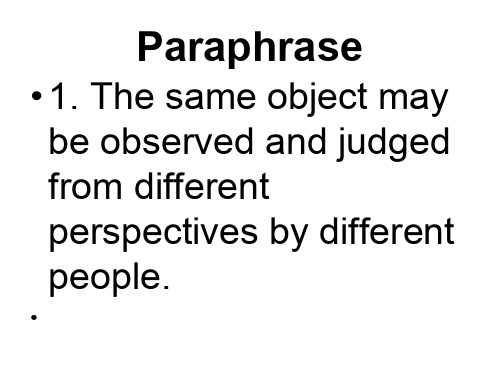
• 1. The same object may be observed and judged from different perspectives by different people.
•
• 2. No time should be wasted on ceremonial procedures because the house , at present, is encountering an extremely crucial problem for the nation.
• 3) Shall we resort to entreaty and humble supplication? What terms shall we find which have not already been exhausted?
• 4. As for me, I'm willing to know the whole truth and be prepared for the worst that might happen, no matter how much pain I may endure.
• 5. The cunning smile, with which the British recently received our petition, will be a trap for you to fall into.
• 2) Are fleets and armies necessary to a work of love and reconciliation? Have we shown ourselves so unwilling to be reconciled that force must be called in to win back our love?
全新版大学英语综合教程5(第二版)unit1-7课后翻译答案

II.Translation P25我的祖母不识字,可是她有一箩筐的神话和传奇故事。
小时候我总是缠着她,要她给我讲故事。
而她在忙完家务之后,总会把我抱到膝上,一边讲故事一边有节奏地晃动我。
我父母发现了我对故事的浓厚兴趣后,不失时机地引导我进行阅读。
他们给我买了许多带插图的故事书,有空的时候就一遍遍地读给我听。
慢慢我认识了很多字,能够自行阅读了。
Although my grandmother was illiterate,she had a good stock of myths and legends.When I was young I gave her no peace,constantly asking her to tell me stories.After she had finished her housework,she would lift me onto her lap and tell stories,all the while rocking me in rhythm.Having noticed my interest in stories,my parents lost no time in initiating me into reading. They bought many storybooks with illustrations,and whenever free,they would read these stories to me over and over again.By and by I had a vocabulary large enough to read on my own.UNIT2II.Translation P58一项又一项的研究发现,食物和一些慢性疾病之间有密切关系。
例如,某些慢性疾病危险的降低与多吃植物为基本成分的食物有关。
因此,在过去的十年中,美国饮食协会敦促美国人减少动物脂肪的摄取,增加水果、蔬菜和谷物的消费。
2022年全新版大学英语综合教程-Unit1-6-TextA-翻译-背诵-作文
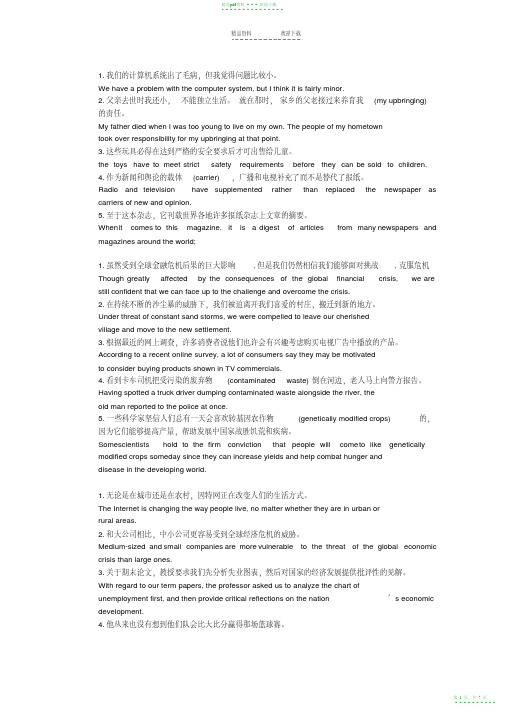
1.我们的计算机系统出了毛病,但我觉得问题比较小。
We have a problem with the computer system, but I think it is fairly minor.2.父亲去世时我还小,不能独立生活。
就在那时,家乡的父老接过来养育我(my upbringing) 的责任。
My father died when I was too young to live on my own. The people of my hometowntook over responsibility for my upbringing at that point.3.这些玩具必得在达到严格的安全要求后才可出售给儿童。
the toys have to meet strict safety requirements before they can be sold to children. 4.作为新闻和舆论的载体(carrier),广播和电视补充了而不是替代了报纸。
Radio and television have supplemented rather than replaced the newspaper as carriers of new and opinion.5.至于这本杂志,它刊载世界各地许多报纸杂志上文章的摘要。
When i t comes to this magazine, it is a digest of articles from many newspapers and magazines around the world;1.虽然受到全球金融危机后果的巨大影响,但是我们仍然相信我们能够面对挑战,克服危机Though greatly affected by the consequences of the global financial crisis, we are still confident that we can face up to the challenge and overcome the crisis.2.在持续不断的沙尘暴的威胁下,我们被迫离开我们喜爱的村庄,搬迁到新的地方。
综合英语教程5 Unit 6 课文翻译

1在很多方面,美国人依然因循守旧。
在日新月异的时代,我们必须记住我们还在坚守多少过去的东西。
年轻人依然步入婚姻殿堂(去年有241万对男女结为夫妇,而在1960年仅有152万对)。
当然,其中有许多人离婚,然而他们又以惊人的速度再婚。
他们生儿育女,但比以前少多了。
他们是教会成员,尽管去教堂的次数比以前少,他们还要子女接受宗教方面的教育。
他们心甘情愿地为教育纳税,他们也为支助医院、博物馆和图书馆等机构慷慨解囊。
事实上,将今日的美国与1950年的相比,相似之处大大超过差异之处。
2美国人好像越来越保守。
1980年大选,尤其是参议院和众议院的选举,标志着选民的政治和社会态度明显右倾。
我们的国家在上个世纪六七十年代不遗余力地挣脱陈旧的束缚,似乎现在想要刹车了,就像谨小慎微的人在放纵自己以后常做的那样。
我们预计会看到对传统家庭价值观的重新首肯,对色情严加控制,回归宗教,以及摒弃某些社会法律条文。
3求爱和结婚的方式有了很大的变化。
说到性的问题,我是在猜疑、压抑和清教徒式的生活环境中长大的,虽然有些粗犷的孩子几乎在什么环境中都能活得不赖,但是我们这一代人中,大多数人活得真不容易。
对当今较为自由的模式,我鼓掌表示毫无保留地赞成。
但是,我相信对有些家庭来说,要适应这些变化绝非易事。
4美国妇女在改变这些规则。
30年前,我完全想象不到一群女性雇员会控告一家大公司,起诉公司因为歧视而少支付了她们数以百万美元的薪金。
我想象不到,女大学生会去找负责运动项目的男性,要求在体育教育的经费中公正地获得她们的一份。
然而,她们正在这么做,而且得到许多男士的支持,他们认识到这些女性诉求的公正性。
工作中,娱乐中,在生活的各个层次,女性在提出新的规则。
5美国在为学校忧心忡忡。
如果我现在有个孩子,那为了安全问题、为了执行纪律以及为了严格的学业要求,我宁愿将孩子送到私立学校。
但是,我怀疑的是,这个孩子接受的教育会不会有我当年在那所良好的公立学校里接受的教育那么好。
21世纪大学实用英语综合教程unit1-8课文翻译及课后习题答案
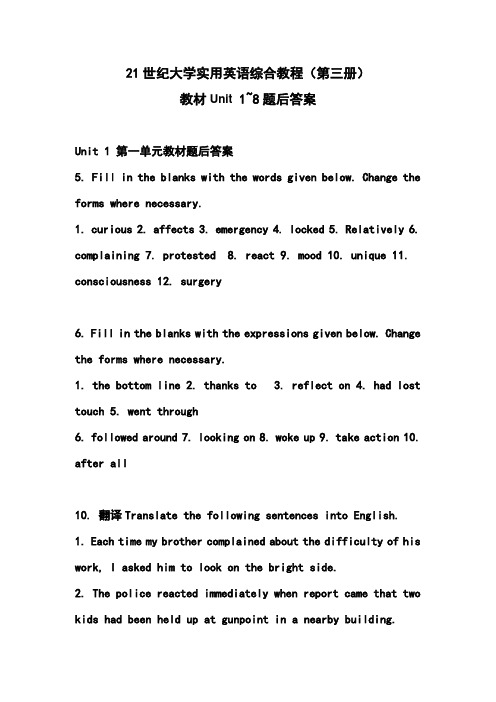
21世纪大学实用英语综合教程(第三册)教材Unit 1~8题后答案Unit 1 第一单元教材题后答案5. Fill in the blanks with the words given below. Change the forms where necessary.1. curious2. affects3. emergency4. locked5. Relatively6. complaining7. protested8. react9. mood 10. unique 11. consciousness 12. surgery6. Fill in the blanks with the expressions given below. Change the forms where necessary.1. the bottom line2. thanks to3. reflect on4. had lost touch5. went through6. followed around7. looking on8. woke up9. take action 10. after all10. 翻译Translate the following sentences into English. 1. Each time my brother complained about the difficulty of his work, I asked him to look on the bright side.2. The police reacted immediately when report came that two kids had been held up at gunpoint in a nearby building.3. When I pointed out the mistakes in her calculation, instead of correcting them as soon as possible, Mary protested that it was not her fault.4. Tom was curious about the joke I told my colleagues, but he didn’t get it.5. Thanks to his positive attitude, Jack took action and saved his own life before he lostconsciousness in the emergency room.6. When I reflect on what I have achieved in the past, I have to say that success comes from hard work. Th at’s the bottom line.Unit 2第二单元教材题后答案5. Fill in the blanks with the words given below. Change the forms where necessary.1. intense2. concept3. committed4. deserve5. selfish6. compromise7. matters8. opponent9. influence 10. effort 11. shortcuts 12. evidence6. Fill in the blanks with the expressions given below. Change the forms where necessary.1. work at2. According to3. run through4. in sight5. live with6. a variety of7. When it comes to8. live up to10. 翻译 Translate the following sentences into English.1. Take Michael Jordan, it’s easy for people to see his achievements while neglect the price of blood and sweat that he has paid on the court in order to come out on top.2. Right in the first English class, our teacher conveyed a clear message to us: as the basic building blocks of the language, new words must be memorized; any other shortcut is fool’s gold.3. Thousands of Chinese laborers contributed greatly to the construction of America’s first transcontinental railr oad, and their intense efforts deserve a page in American history.4. When it comes to training, the coach has no problem living with all sorts of complaints of the players but he never compromises with any of them.5. Traditional ethics seem especially important in some situations where the margin between right and wrong is as thin as an eggshell.6. As competition intensifies, our opponents and we are all working hard to live up to higher service standards.Unit 3第三单元教材题后答案5. Fill in the blanks with the words given below. Change the forms where necessary.1. withdraw2. opposite3. consult4. seeking5. chief6. frustrated7. gather8. suggestions 9. numerous 10. crucial 11. approval 12. yield6. Fill in the blanks with the expressions given below. Change the forms where necessary.1. give up on2. kicked out3. at the end of my rope4. count!-out5. provide!-wit6. that is7. on the brink of8. moved forward10. 翻译Translate the following sentences into English.1. The health report stresses the importance of fresh fruit and vegetables in our diet.2. I spent a whole week gathering the courage to say no to their request.3. These journeys made him realize to the fullest extent that many of the world’s species were on the brink of extinction.4. Approval of the patient’s family should be sought before doctors carry out such operations.5. Improved consumer confidence is crucial to an economic recovery.6. We gave up on the missing mountain climber after he had been missing for two weeks.Unit 4第四单元教材题后答案5. Fill in the blanks with the words given below. Change the forms where necessary.1. mankind2. determination3. burden4. define5. financial6. resources7. research 8. cure 9. evil 10. hardship 11. suicide 12. suffered6. Fill in the blanks with the expressions given below. Change the forms where necessary.1. broke down2. took!-for granted3. look!-in the eye4. couldn’t help but respect5. crying over6. no doubt7. dressing up8. slipped into9. 翻译 Translate the following sentences into English.1. He was no doubt a great hero so people couldn’t help but cry over his death.2. The actor used his celebrity status to fund research that might someday yield a cure for AIDS.3. The disabled man once considered suicide to relieve his family of the heavy burden.4. Children dress up as Superman to capture adults’ attention.5. It wasn’t until I matured that I realized I shouldn’t be afraid to look adversity and hardship in the eye.6. He could have easily stayed at home, for he had plenty of financial resources to keep him from worrying about medical bills..Unit 5第五单元教材题后答案5. Fill in the blanks with the words given below. Change the forms where necessary.1. discharged2. anger3. latter4. relationship5. engaged6. backgrounds7. miserable 8. invitation 9. match 10. folded 11. overseas 12. proposethe forms where necessary.1. broke down2. from time to time3. From the very beginning4. knocked down5. agreed to6. talk!-round7. due to8. give in9. in silence 10. go abroad10. 翻译 Translate the following sentences into English. 1. I just received a email in which Jessica expressed her regret of ending the relationship with her beloved boyfriend.2. She broke down at the loss of her family, and the impact of this miserable incident remained for the rest of her life.3. Both my parents object to my going abroad to further my studies. I wonder if I should give in or try to talk them round.4. Edgar was not good with words, so whenever Jessica vented her anger on him, he only endured it in silence.5. The cheerful background music matches his mood very well, for he’s just got engaged to his beloved girlfriend.6. From time to time the system would utter a piercing noise indicating its inability to run properly.Unit 6第六单元教材题后答案forms where necessary.1. rejected2. properly3. judgment4. employer5. lack6. feedback7. qualified8. suitable 9. candidate 10. confident 11. potential 12. punctual6. Fill in the blanks with the expressions given below. Change the forms where necessary.1. cope with2. miss out3. applied for4. keep!-in mind5. for a bit6. reflecting on7. fill out8. get back9. a variety of 10. To our amazement10. 翻译Translate the following sentences into English.1. Sometimes even if you are totally qualified for the job, you may still be rejected.2. You should learn to cope with difficult situation. And even more important, don’t look to others for help.3. To my shock/amazement, he was not only involved in a variety of extracurricular activities but also had applied for a part-time job.4. Keep in mind that one more failure is one step closer to success.5. Don’t dwell on the reasons that are out of your control, because this job doesn’t entirely suit you and your chances are slim.6. Although you may not always like to hear negative feedback, whatever you do, don’t burn your bridges.Unit 7第七单元教材题后答案5. Fill in the blanks with the words given below. Change the forms where necessary.1. tuition2. anxiety3. horrors4. switched5. quarter6. steady7. roughly8. prospects 9. disorder 10. represent 11. apparent 12. population6. Fill in the blanks with the expressions given below. Change the forms where necessary.1. were booked up2. not getting anywhere3. ups and downs4. burst out5. get along with6. broke up with7. in advance8. had no choice9. In spite of 10. take your own life10. 翻译Translate the following sentences into English.1. The students who seek psychological counseling represent only the tip of the iceberg. Most students endure the stress in silence.2. The horror movie overwhelmed him so much that he began to suffer from a sleeping disorder, even insomnia.3. Lisa had always been a straight-A student until her junior year, when she had to hold down two part-time jobs to pay her tuition.4. In spite of the result of the aptitude test, John decided to switch his major from accounting to psychology.5. He would rather remain a sales clerk, apparently because he prefers a steady life to a life full of ups and downs.6. The computer has broken down on more than one occasion. Isn’t that enough for professional helpUnit 8第八单元教材题后答案5. Fill in the blanks with the words given below. Change the forms where necessary.1. chemical2. soil3. disturb4. mixture5. substance6. ruin7. consumers8. stable9. pollution 10. supplies 11. decay 12. main6. Fill in the blanks with the expressions given below. Change the forms where necessary.1. leaked out2. due to3. are known as4. depend on5. giving off6. make up7. live on 8. have used up10. 翻译 Translate the following sentences into English.1. With the construction of the nuclear power plant, this city now doesn’t have to worry about its own electricity supply. Instead, it can supply electricity to other cities nearby.2. These vegetables do not decay when kept at a relatively stable low temperature.3. This city is known as the financial center of the country. The development of its economy depends heavily on banking and foreign trade.4. This plant only lives on the top of certain high mountains and gives off a very sweet smell in spring.5. The main cause of thi s area’s water pollution i the chemical substance that leaks out of a paper mill by the river bank.6. This kind of litter is made up of a mixture of chemical waste. It has poisoned the soil, ruining it completely.。
全新大学英语综合教程第二版第5册unit6

Grant and Lee: A study in ContrastsBruce CattonWhen Ulysses S. Grant and Robert E. Lee met in the parlor of a modest house at Appomattox Court House, Virginia, on April 9, 1865, to work out the terms for the surrender of Lee's Army of Northern Virginia, a great chapter in American life came to a close, and a great new chapter began.These men were bringing the Civil War to its virtual finish. To be sure, other armies had yet to surrender, and for a few days the fugitive Confederate government would struggle desperately and vainly, trying to find some way to go on living now that its chief support was gone. But in effect it was all over when Grant and Lee signed the papers. And the little room where they wrote out the terms was the scene of one of the poignant, dramatic contrasts in American history. They were two strong men, these oddly different generals, and they represented the strengths of two conflicting currents that, through them, had come into final collision.Back of Robert E. Lee was the notion that the old aristocratic concept might somehow survive and be dominant in American life.Lee was tidewater Virginia, and in his background were family, culture, and tradition. . . the age of chivalry transplanted to a New World which was making its own legends and its own myths. He embodied a way of life that had come down through the age of knighthood and the English country squire. America was a land that was beginning all over again, dedicated to nothing much more complicated than the rather hazy belief that all men had equal rights and should have an equal chance in the world. In such a land Lee stood for the feeling that it was somehow of advantage to human society to have a pronounced inequality in the social structure. There should be a leisure class, backed by ownership of land; in turn, society itself should be keyed to the land as the chief source of wealth and influence. It would bring forth (according to this ideal) a class of men with a strong sense of obligation to the community; men who lived not to gain advantage for themselves, but to meet the solemn obligations which had been laid on them by the very fact that they were privileged. From them the country would get its leadership; to them it could look for the higher values--of thought, of conduct, of personal deportment--to give it strength and virtue.Lee embodied the noblest elements of this aristocratic ideal. Through him, the landed nobility justified itself. For four years, the Southern states had fought a desperate war to uphold the ideals for which Lee stood. In the end, it almost seemed as if the Confederacy fought for Lee; as if he himself was the Confederacy . . . the best thing that the way of life for which the Confederacy stood could ever have to offer. He had passed into legend before Appomattox. Thousands of tired, underfed, poorly clothed Confederate soldiers, long since past the simple enthusiasm of the early days of the struggle, somehow considered Lee the symbol of everything for which they had been willing to die. But they could not quite put this feeling into words. If the Lost Cause, sanctified by so much heroism and so many deaths, had a living justification, its justification was General Lee.Grant, the son of a tanner on the Western frontier, was everything Lee was not. He had come up the hard way and embodied nothing in particular except the eternal toughness and sinewy fiberof the men who grew up beyond the mountains. He was one of a body of men who owed reverence and obeisance to no one, who were self-reliant to a fault, who cared hardly anything for the past but who had a sharp eye for the future.These frontier men were the precise opposites of the tidewater aristocrats. Back of them, in the great surge that had taken people over the Alleghenies and into the opening Western country, there was a deep, implicit dissatisfaction with a past that had settled into grooves. They stood for democracy, not from any reasoned conclusion about the proper ordering of human society, but simply because they had grown up in the middle of democracy and knew how it worked. Their society might have privileges, but they would be privileges each man had won for himself. Forms and patterns meant nothing. No man was born to anything, except perhaps to a chance to show how far he could rise. Life was competition.Yet along with this feeling had come a deep sense of belonging to a national community. The Westerner who developed a farm, opened a shop, or set up in business as a trader could hope to prosper only as his own community prospered--and his community ran from the Atlantic to the Pacific and from Canada down to Mexico. If the land was settled, with towns and highways and accessible markets, he could better himself. He saw his fate in terms of the nation's own destiny. As its horizons expanded, so did his. He had, in other words, an acute dollars-and-cents stake in the continued growth and development of his country.And that, perhaps, is where the contrast between Grant and Lee becomes most striking. The Virginia aristocrat, inevitably, saw himself in relation to his own region. He lived in a static society which could endure almost anything except change. Instinctively, his first loyalty would go to the locality in which that society existed. He would fight to the limit of endurance to defend it, because in defending it he was defending everything that gave his own life its deepest meaning.The Westerner, on the other hand, would fight with an equal tenacity for the broader concept of society. He fought so because everything he lived by was tied to growth, expansion, and a constantly widening horizon. What he lived by would survive or fall with the nation itself He could not possibly stand by unmoved in the face of an attempt to destroy the Union. He would combat it with everything he had, because he could only see it as an effort to cut the ground out from under his feet.So Grant and Lee were in complete contrast, representing two diametrically opposed elements in American life. Grant was the modem man emerging; beyond him, ready to come on the stage, was the great age of steel and machinery, of crowded cities and a restless burgeoning vitality. Lee might have ridden down from the old age of chivalry, lance in hand, silken banner fluttering over his head. Each man was the perfect champion of his cause, drawing both his strengths and his weaknesses from the people he led.Yet it was not all contrast, after all. Different as they were--in background, in personality, in underlying aspiration--these two great soldiers had much in common. Under everything else, they were marvelous fighters. Furthermore, their fighting qualities were really very much alike. Each man had, to begin with, the great virtue of utter tenacity and fidelity. Grant fought his waydown the Mississippi Valley in spite of acute personal discouragement and profound military handicaps. Lee hung on in the trenches at Petersburg after hope itself had died. In each man there was an indomitable quality. . . . the born fighter's refusal to give up as long as he can still remain on his feet and lift his two fists.Daring and resourcefulness they had, too; the ability to think faster and move faster than the enemy. These were the qualities which gave Lee the dazzling campaigns of Second Manassas and Chancellorsville and won Vicksburg for Grant.Lastly, and perhaps greatest of all, there was the ability, at the end, to turn quickly from war topeace once the fighting was over. Out of the way these two men behaved at Appomattox carnethe possibility of a peace of reconciliation. It was a possibility not wholly realized, in the years tocome, but which did, in the end, help the two sections to become one nation again . . . after a war whose bitterness might have seemed to make such a reunion wholly impossible. No part of eitherman's life became him more than the part he played in this brief meeting in the McLean house atAppomattox. Their behavior there put all succeeding generations of Americans in their debt.Two great Americans, Grant and Lee--very different, yet under everything very much alike. Their encounter at Appomattox was one of the great moments of American history.。
Unit 4 Unforgettable Teachers全新版大学英语综合教程五课文翻译
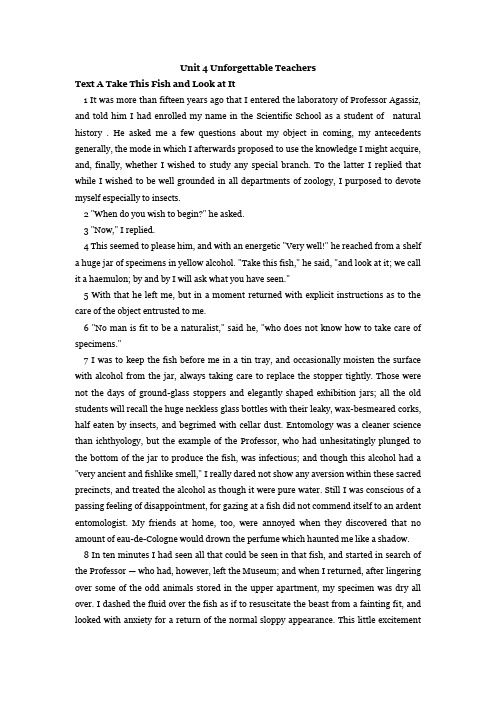
Unit 4 Unforgettable TeachersText A Take This Fish and Look at It1 It was more than fifteen years ago that I entered the laboratory of Professor Agassiz, and told him I had enrolled my name in the Scientific School as a student of natural history . He asked me a few questions about my object in coming, my antecedents generally, the mode in which I afterwards proposed to use the knowledge I might acquire, and, finally, whether I wished to study any special branch. To the latter I replied that while I wished to be well grounded in all departments of zoology, I purposed to devote myself especially to insects.2 "When do you wish to begin?" he asked.3 "Now," I replied.4 This seemed to please him, and with an energetic "Very well!" he reached from a shelfa huge jar of specimens in yellow alcohol. "Take this fish," he said, "and look at it; we call it a haemulon; by and by I will ask what you have seen."5 With that he left me, but in a moment returned with explicit instructions as to the care of the object entrusted to me.6 "No man is fit to be a naturalist," said he, "who does not know how to take care of specimens."7 I was to keep the fish before me in a tin tray, and occasionally moisten the surface with alcohol from the jar, always taking care to replace the stopper tightly. Those were not the days of ground-glass stoppers and elegantly shaped exhibition jars; all the old students will recall the huge neckless glass bottles with their leaky, wax-besmeared corks, half eaten by insects, and begrimed with cellar dust. Entomology was a cleaner science than ichthyology, but the example of the Professor, who had unhesitatingly plunged to the bottom of the jar to produce the fish, was infectious; and though this alcohol had a "very ancient and fishlike smell," I really dared not show any aversion within these sacred precincts, and treated the alcohol as though it were pure water. Still I was conscious of a passing feeling of disappointment, for gazing at a fish did not commend itself to an ardent entomologist. My friends at home, too, were annoyed when they discovered that no amount of eau-de-Cologne would drown the perfume which haunted me like a shadow.8 In ten minutes I had seen all that could be seen in that fish, and started in search of the Professor — who had, however, left the Museum; and when I returned, after lingering over some of the odd animals stored in the upper apartment, my specimen was dry all over. I dashed the fluid over the fish as if to resuscitate the beast from a fainting fit, and looked with anxiety for a return of the normal sloppy appearance. This little excitementover, nothing was to be done but to return to a steadfast gaze at my mute companion. Half an hour passed —an hour —another hour; the fish began to look loathsome. I turned it over and around; looked it in the face — ghastly; from behind, beneath, above, sideways, at three-quarters' view — just as ghastly. I was in despair; at an early hour I concluded that lunch was necessary; so, with infinite relief, the fish was carefully replaced in the jar, and for an hour I was free.9 On my return, I learned that Professor Agassiz had been at the Museum, but had gone, and would not return for several hours. My fellow-students were too busy to be disturbed by continued conversation. Slowly I drew forth that hideous fish, and with a feeling of desperation again looked at it. I might not use a magnifying-glass; instruments of all kinds were interdicted. My two hands, my two eyes, and the fish: it seemed a most limited field. I pushed my finger down its throat to feel how sharp the teeth were. I began to count the scales in the different rows, until I was convinced that was nonsense. At last a happy thought struck me — I would draw the fish; and with surprise I began to discover new features in the creature. Just then the Professor returned.10 "That is right," said he; "a pencil is one of the best of eyes. I am glad to notice, too, that you keep your specimen wet, and your bottle corked."11 With these encouraging words, he added: "Well, what is it like?"12 He listened attentively to my brief rehearsal of the structure of parts whose names were still unknown to me: the fringed gill-arches and movable operculum; the pores of the head, fleshy lips and lidless eyes; the lateral line, the spinous fins and forked tail; the compressed and arched body. When I finished, he waited as if expecting more, and then, with an air of disappointment:13 "You have not looked very carefully; why," he continued more earnestly, "you haven't even seen one of the most conspicuous features of the animal, which is plainly before your eyes as the fish itself; look again, look again!" and he left me to my misery.14 I was piqued; I was mortified. Still more of that wretched fish! But now I set myself to my task with a will, and discovered one new thing after another, until I saw how just the Professor's criticism had been. The afternoon passed quickly; and when, towards its close, the Professor inquired:15 "Do you see it yet?"16 "No," I replied, "I am certain I do not, but I see how little I saw before."17 "That is next best," said he, earnestly, "but I won't hear you now; put away your fish and go home; perhaps you will be ready with a better answer in the morning. I will examine you before you look at the fish."18 This was disconcerting. Not only must I think of my fish all night, studying, without the object before me, what this unknown but most visible feature might be; but also, without reviewing my discoveries, I must give an exact account of them the next day. I had a bad memory; so I walked home by Charles River in a distracted state, with my two perplexities.19 The cordial greeting from the Professor the next morning was reassuring; here was a man who seemed to be quite as anxious as I that I should see for myself what he saw.20 "Do you perhaps mean," I asked, "that the fish has symmetrical sides with paired organs?"21 His thoroughly pleased "Of course! Of course!" repaid the wakeful hours of the previous night. After he had discoursed most happily and enthusiastically — as he always did — upon the importance of this point, I ventured to ask what I should do next.22 "Oh, look at your fish!" he said, and left me again to my own devices. In a little more than an hour he returned, and heard my new catalogue.23 "That is good, that is good!" he repeated; "but that is not all; go on"; and so for three long days he placed that fish before my eyes, forbidding me to look at anything else, or to use any artificial aid. "Look, look, look," was his repeated injunction.24 This was the best entomological lesson I ever had — a lesson whose influence has extended to the details of every subsequent study; a legacy the Professor had left to me, as he has left it to so many others, of inestimable value which we could not buy, with which we cannot part.25 The fourth day, a second fish of the same group was placed beside the first, and I was bidden to point out the resemblances and differences between the two; another and another followed, until the entire family lay before me, and a whole legion of jars covered the table and surrounding shelves; the odor had become a pleasant perfume; and even now, the sight of an old, six-inch worm-eaten cork brings fragrant memories.26 The whole group of haemulons was thus brought in review; and, whether engaged upon the dissection of the internal organs, the preparation and examination of the bony framework, or the description of the various parts, Agassiz's training in the method of observing facts and their orderly arrangement was ever accompanied by the urgent exhortation not to be content with them.27 "Facts are stupid things," he would say, "until brought into connection with some general law."28 At the end of eight months, it was almost with reluctance that I left these friends and turned to insects; but what I had gained by this outside experience has been ofgreater value than years of later investigation in my favorite groups.把这条鱼拿去好好看看塞缪尔·斯卡德我是在15余年前进入阿加西兹教授的实验室的,告诉他我已在科学学院注册读博物学。
- 1、下载文档前请自行甄别文档内容的完整性,平台不提供额外的编辑、内容补充、找答案等附加服务。
- 2、"仅部分预览"的文档,不可在线预览部分如存在完整性等问题,可反馈申请退款(可完整预览的文档不适用该条件!)。
- 3、如文档侵犯您的权益,请联系客服反馈,我们会尽快为您处理(人工客服工作时间:9:00-18:30)。
1在很多方面,美国人依然因循守旧。
在日新月异的时代,我们必须记住我们还在坚守多少过去的东西。
年轻人依然步入婚姻殿堂(去年有241万对男女结为夫妇,而在1960年仅有152万对)。
当然,其中有许多人离婚,然而他们又以惊人的速度再婚。
他们生儿育女,但比以前少多了。
他们是教会成员,尽管去教堂的次数比以前少,他们还要子女接受宗教方面的教育。
他们心甘情愿地为教育纳税,他们也为支助医院、博物馆和图书馆等机构慷慨解囊。
事实上,将今日的美国与1950年的相比,相似之处大大超过差异之处。
2美国人好像越来越保守。
1980年大选,尤其是参议院和众议院的选举,标志着选民的政治和社会态度明显右倾。
我们的国家在上个世纪六七十年代不遗余力地挣脱陈旧的束缚,似乎现在想要刹车了,就像谨小慎微的人在放纵自己以后常做的那样。
我们预计会看到对传统家庭价值观的重新首肯,对色情严加控制,回归宗教,以及摒弃某些社会法律条文。
3求爱和结婚的方式有了很大的变化。
说到性的问题,我是在猜疑、压抑和清教徒式的生活环境中长大的,虽然有些粗犷的孩子几乎在什么环境中都能活得不赖,但是我们这一代人中,大多数人活得真不容易。
对当今较为自由的模式,我鼓掌表示毫无保留地赞成。
但是,我相信对有些家庭来说,要适应这些变化绝非易事。
4美国妇女在改变这些规则。
30年前,我完全想象不到一群女性雇员会控告一家大公司,起诉公司因为歧视而少支付了她们数以百万美元的薪金。
我想象不到,女大学生会去找负责运动项目的男性,要求在体育教育的经费中公正地获得她们的一份。
然而,她们正在这么做,而且得到许多男士的支持,他们认识到这些女性诉求的公正性。
工作中,娱乐中,在生活的各个层次,女性在提出新的规则。
5美国在为学校忧心忡忡。
如果我现在有个孩子,那为了安全问题、为了执行纪律以及为了严格的学业要求,我宁愿将孩子送到私立学校。
但是,我怀疑的是,这个孩子接受的教育会不会有我当年在那所良好的公立学校里接受的教育那么好。
问题是,良好的公立学校少得可怜。
因此,我不想冒险把孩子送进不够格的学校去。
6有些美国人必须靠吃救济为生。
显而易见,既然我们的国家只需要在可供劳动力的一部分就能生产出所有的必需品,那么对那些找不到工作的人必须要发放某种形式的社会救助。
一想到典型的接受救济的对象,我就想起一个邻居,一位年轻女子,她丈夫在车祸中惨死,给她留下三个小孩。
在早年的困难时期,她完全可能尝到贫困的滋味。
但是,凭着家庭救助,她能够供养自己的孩子,把他们培养成三个纳税的良好公民。
我喜爱这种社会救助,并且乐意助上一臂之力。
归根到底,美国是个富有同情心的社会。
7美国无法为年轻家庭提供住房。
我认为这是美国家庭生活面临着的最为严重的问题,令我十分吃惊的是,国家竟然任由这种情况发展。
十多年来,像我这样周游世界的人,很清楚在瑞典、丹麦、俄罗斯和印度这样的国家里,年轻人几乎不可能得到房屋。
在瑞典,常常要在婚后等待十一个年头,我曾经问过:“什么出错了?”在我们看来,任何国家主要的责任就是为年轻人提供住房,让他们成家。
然而,这个可怕的社会顽疾现在已降临到美国,而且出于同样的原因。
在我们的社会里,开发商觉得建筑有三个浴室的住房,售价为220,000美元,再加上19%的按揭,有利可图,但却发现几乎无法为年轻夫妇建筑小面积的住房。
一个大国没有能力为年轻人提供住房就等于承认一个必须加以纠正的失误。
8我们的前景仍然一片大好。
我发现,与其他任何国家相比,我们的机会至少不相上下,甚至更好。
我们有一大块完整的疆土,有世界上最强的农业,有丰富的矿藏,有用以灌溉的宽广的河流,还有无与伦比的运输交通系统。
我们还有来自四大洲的各色人种,完美地结合在一起,各自拥有自己的传统和优势。
但是,最难能可贵的是,我们拥有一个独一无二、平衡的政府体制。
9.我认为美国具有最古老的政府模式,因为自从1789年我们建立起现在的民主制度以来,其他的国家不是经历了议会制度的变革,就是经过了革命的洗礼;而只有我们的制度一如既
往,而且会经久不衰,给予最大多数的人最高程度的幸福。
